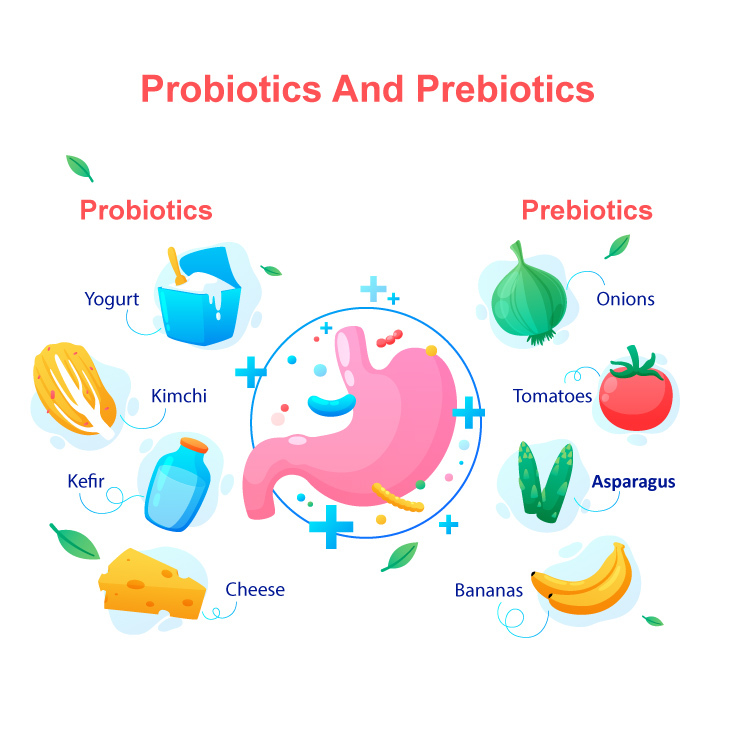
Probiotic and Prebiotic Foods: The Key to Gut Health and Wellness in India
Probiotic and Prebiotic Foods: The Key to Gut Health and Wellness in India
In recent years, there’s been a growing awareness of gut health and its impact on overall wellness. Two vital components that play a significant role in gut health are probiotics and prebiotics. Both work hand-in-hand to support a balanced gut microbiome, yet they serve different purposes. This blog will dive into what probiotics and prebiotics are, their benefits, and examples of foods that are commonly found and used in India.
What Are Probiotics?
Probiotics are live beneficial bacteria or yeasts that reside in our intestines and contribute to a healthy gut microbiome. These “good bacteria” aid in digestion, nutrient absorption, immune system function, and more. Probiotics are often referred to as “friendly bacteria” because they can restore the natural balance of bacteria in the gut, particularly after antibiotic treatments.
Benefits of Probiotics
- Improved Digestion: Probiotics assist in breaking down food, making it easier to absorb essential nutrients.
- Enhanced Immunity: They play a role in fighting off pathogens and boosting immune health.
- Mental Health Support: A balanced gut can positively impact mood and mental health, reducing risks of anxiety and depression.
- Reduced Bloating and Gas: Probiotics can help ease digestive issues like bloating and gas.
- Better Skin Health: Research suggests that probiotics can contribute to healthier skin by supporting a balanced internal microbiome.
Probiotic-Rich Indian Foods
India has a rich tradition of fermented foods that are naturally high in probiotics. Here are some probiotic-rich foods commonly found in Indian households:
-
Curd (Dahi) – Curd is one of the most popular probiotic foods in India, aiding in digestion and cooling the body. It’s best to consume homemade curd to ensure live bacterial cultures.
-
Buttermilk (Chaas) – Known for its cooling properties, buttermilk is a traditional probiotic beverage made by diluting curd with water, often flavored with spices. It’s great for digestion and hydration.
-
Idli and Dosa – These South Indian staples are made by fermenting rice and urad dal batter, making them a good source of probiotics. Fermentation enhances the nutrient profile and digestibility of these foods.
-
Kanji – A fermented drink made from black carrots, mustard seeds, and spices, kanji is popular in North India during winter months. It’s rich in probiotics and supports gut health.
-
Pickles (Achar) – Traditional Indian pickles, especially those made without vinegar, contain natural probiotics. Look for homemade or non-commercial varieties, as they are fermented naturally.
-
Fermented Rice – In some southern and eastern parts of India, leftover rice is soaked in water overnight and eaten the next morning with salt or curd, known as panta bhat in Bengal. This is a natural probiotic food.
What Are Prebiotics?
Prebiotics are types of dietary fiber that feed the friendly bacteria (probiotics) in the gut. Unlike probiotics, which are live bacteria, prebiotics are plant fibers that our bodies cannot digest. Instead, they travel to the colon, where they act as a food source for gut bacteria, supporting their growth and activity.
Benefits of Prebiotics
- Support Probiotic Growth: Prebiotics nourish the good bacteria in the gut, enhancing the effects of probiotics.
- Improved Digestion: They help in regulating bowel movements and can reduce symptoms of digestive disorders.
- Enhanced Calcium Absorption: Prebiotics improve mineral absorption, particularly calcium, which is crucial for bone health.
- Blood Sugar Regulation: Prebiotic fibers can help regulate blood sugar levels and reduce the risk of metabolic disorders.
- Reduced Inflammation: Prebiotics can support a balanced immune response and help reduce inflammation.
Prebiotic-Rich Indian Foods
India’s diverse cuisine includes several prebiotic-rich foods that can be easily incorporated into a balanced diet:
-
Garlic (Lahsun) – Garlic is a powerful prebiotic food, providing inulin, a type of fiber that feeds gut bacteria. It’s often used in Indian curries, chutneys, and pickles.
-
Onions (Pyaaz) – Like garlic, onions are high in prebiotic fibers and widely used in Indian cooking to enhance flavor and support gut health.
-
Bananas (Kela) – Bananas, especially raw or unripe ones, contain prebiotic fiber and are commonly enjoyed in various forms across India.
-
Whole Grains (Jowar, Bajra, Ragi) – Whole grains like sorghum (jowar), pearl millet (bajra), and finger millet (ragi) are excellent sources of prebiotic fibers. They’re staples in many Indian dishes, such as rotis and porridges.
-
Fenugreek Seeds (Methi) – Fenugreek seeds are not only beneficial for digestion but also a natural source of prebiotics. They are often used in Indian dishes and are also soaked overnight for better digestion.
-
Chicory Root (Kasni) – While chicory root is less common in Indian households, it’s a powerful prebiotic food that can be used in herbal teas.
How to Incorporate Probiotics and Prebiotics into Your Diet
Balancing both probiotics and prebiotics in your diet can optimize gut health, benefiting your digestion, immunity, and even mental health. Here’s how you can incorporate them effectively:
- Combine in Meals: Try pairing curd (probiotic) with a side of whole grain roti or vegetables like onions and garlic (prebiotic).
- Add Variety: Include different sources of probiotics and prebiotics in your weekly meals. This ensures a diverse microbiome.
- Consume Fresh Ferments: Eat fermented foods like idli, dosa, and homemade pickles frequently, as they contain live cultures beneficial for the gut.
- Include Fibrous Foods: Add prebiotic-rich foods such as jowar, bajra, and bananas to your daily diet. This helps in providing food for probiotics, boosting their effectiveness.
Final Thoughts
The synergy between probiotics and prebiotics is key to cultivating a healthy gut, which, in turn, supports overall health and wellness. By incorporating traditional Indian foods rich in probiotics and prebiotics, you can naturally support your digestive system and experience benefits that go far beyond gut health. Start with small changes, enjoy the flavors of these time-honored foods, and feel the positive effects they bring to your well-being.
For a healthier lifestyle and balanced wellness, focus on building a routine that includes both probiotic and prebiotic foods. Your gut will thank you, and so will your body and mind!
Buy Now | Available for delivery across India.
Order Holistic products now and experience the benefits of Ayurveda.
Explore Holistic Health Products